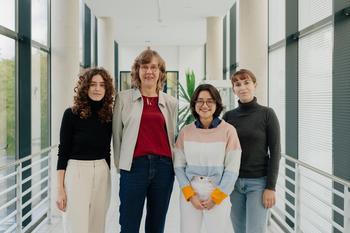SFB-Project: Contested Order of Emotions: (Anti)Feminist Discourses in Social Media
Deutsche Forschungsgemeinschaft (DFG), Sonderforschungsbereich 1171 Affective Societies
Shame, anger, empathy – these emotions are central both in the narratives shared by survivors of sexual violence under the hashtags #NiUnaMenos since 2015 and #MeToo since 2017, as well as in the responses to these posts. In the third phase of the project, the communication research project examines feminist and anti-feminist discourses across diverse digital platforms, aiming to comprehend, analyze, and theorize the technological and algorithmic configuration of networked publics as infrastructures of feeling (Coleman, 2018). The focus lies in investigating how the infrastructure of a social platform (such as the character limit on Twitter/X or various filters on Instagram) facilitates, prefigures, and shapes specific affective media practices, as well as how contemporary forms of public articulation, opinion formation, and mobilization on controversial issues are affectively modulated and structured through the affordances of digital platforms.
The thematic emphasis on (anti-)feminist debates that emerge concerning topics like abortion rights, rights of trans* individuals, evolving family structures, or care work, enables the examination of conflicts within various feminist currents as well as antagonistic formations between feminist and anti-feminist actors and groups. Since these debates occur on an international scale, they provide an avenue for scrutinizing the transnational dynamics of affective publics (Papacharissi, 2015), which arise through the interaction of different sets of actors (journalists, activists, social media users) on digital platforms. Simultaneously, processes of communicative mobilization by anti-feminist actors can be investigated. The concept of affective publics allows for the understanding of the temporality, materiality, and corporeality of such formations as digitally networked public spheres. From an affect theory perspective, it can be traced which affects mobilize, and which affects contribute to (temporary) community building as well as to the emergence of "online culture wars" (Nagle, 2017), and how claims to (correct) emotional responses are publicly negotiated.
Methodologically, the project builds upon the work of its first two phases and extends them by incorporating a mixed-methods approach involving quantitative, (semi-)automated, and qualitative techniques of video, image, and text analysis. The social media analysis is expanded to include platforms TikTok and Instagram, acknowledging the significance of visual communication in digital public spheres. Of particular interest is the circulation of content across platforms and the specific platform logics of visibility that intensify polarizations or affective intensities. To adequately address the importance of bodies in (anti-)feminist discourses, we employ image and video analytical methods, with the involvement of visual studies expert Kerstin Schankweiler as a fellow in the project. Guiding the research are the following questions: How do affective publics mobilize within (anti-)feminist discourses? Which affects and emotions become subjects of discursive negotiations? How are users' affective media practices shaped by platform infrastructures?
Recent Publications
Adlung, S., Lünenborg, M., & Raetzsch, C. (2021). Pitching Gender in a Racist Tune: The Affective Publics of the #120decibel Campaign. Media and Communication, 9(2), 16–26. doi:https://doi.org/10.17645/mac.v9i2.3749
Lünenborg, M. (2020). Affective Publics: Understanding the Dynamic Formation of Public Articulations Beyond the Public Sphere. In A. Fleig & C. von Scheve (Hrsg.), Public Spheres of Resonance Constellations of Affect and Language (S. 30–48). London: Routledge.
Lünenborg, M. (2021). Soziale Medien, Emotionen und Affekte. In J.-H. Schmidt & M. Taddicken (Hrsg.), Handbuch Soziale Medien (S. 1–18). Wiesbaden: Springer VS. doi:http://dx.doi.org/10.1007/978-3-658-03895-3_24-1
Lünenborg, M., & Maier, T. (2013). Gender Media Studies. Eine Einführung. Konstanz: UVK.
Lünenborg, M., & Maier, T. (2018). The Turn to Affect and Emotion in Media Studies. Media and Communication, 6(3), 1–4. doi:10.17645/mac.v6i3.1732
Lünenborg, M., & Medeiros, D. (2021). Journalism as an Affective Institution. Emotional Labor and the Discourse on Fraud at Der Spiegel. Journalism Studies, 22(12), 1720–1738. http://dx.doi.org/10.1080/1461670X.2021.1873820
Lünenborg, M., & Medeiros, D. (2023). Under Pressure: Journalism as an Affective Institution. In J. Böttger, S. Calkins, J. Slaby, & M. Churcher (Hrsg.), Affect, Institution, Power. London: Routledge.
Lünenborg, M., & Medeiros, D. (2023): Zur Bedeutung von Emotionen im Journalismus. In: K. Meier, C. Neuberger (Hrsg.), Journalismusforschung: Stand und Perspektive (3. Auflg.). Baden-Baden: Nomos.
Lünenborg, M., & Röttger-Rössler, B. (Hrgs.) (2023). Affective Formation of Publics: Places, Networks, and Media. Routledge. https://doi.org/10.4324/9781003365426
Lünenborg, M., Töpper, C., Sūna, L., & Maier, T. (2021). Affektive Medienpraktiken. Emotionen, Körper, Zugehörigkeiten im Reality TV. Wiesbaden: Springer VS.
Makhashvili, A., Medeiros, D., & Lünenborg, M. (2022). Challenging Journalistic Authority in the Networked Affective Dynamics of #Chemnitz. Social Media + Society, 8(4), 1–14. https://doi.org/10.1177/20563051221146185
Makhashvili, A. (2023). Hijacking Solidarity: Affective Networking of Far-Right Publics on Twitter. In M. Lünenborg & B. Röttger-Rössler (Hrgs.), Affective Formation of Publics: Places, Networks, and Media (pp. 149–172). Routledge. https://doi.org/10.4324/9781003365426
Medeiros, D., & Makhashvili, A. (2022). United in Grief? Emotional Communities around the Far-Right Terror Attack in Hanau on TV and Twitter. Media and Communication, 10(3). https://doi.org/10.17645/mac.v10i3.5438


